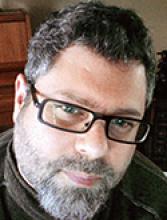In my last article I wrote that Spirit attunement and ego consciousness are rival states of being. Jesus refers to this internal rivalry by pitting the self against the Self. Jesus teaches that in order to truly live, one must deny one’s self, crucify one’s self or lose one’s self. Paul teaches this as well, with regular references to “dying to self” and being “crucified with Christ.”
Now a certain question jumps out at me when I hear Jesus or Paul talk about crucifying or denying or losing one’s self: If one’s self is being denied, crucified or lost, then who or what is doing the denying, crucifying or losing? There must be another “me” doing these things to “me.” So who or what is this other self?
In most of his teachings Jesus invites us to live out of a different “self” or state of consciousness or mode of being. Jesus is inviting us to recognize and live out of that part of us that is in sync with God’s Spirit. The Quakers call this our Inner Light. I believe Spirit baptism is becoming conscious of that centre of light within me that is united with God. It is becoming aware that God’s presence abides in the depth of my being.
Jesus says in Luke 17:20-21: “The kingdom of God is not out there somewhere, the kingdom of God is within you” (my paraphrase). Jesus wants to open our eyes to a new reality, not just in the world around us, but also within us. Once our eyes are opened to this new reality, to this new “self” within, we must choose which self we will let live through us.
There are many different ways of talking about these opposing selves or states of consciousness. The fallen self vs. the image of God; a new creature in Christ vs. the natural self; “Christ in you” vs. the carnal self; the first Adam vs. the last Adam; the “new human” vs. the “old human”; or the true self vs. the false self.
I call them the small self and the whole self.
The small self is what most of us identify with most of the time, even us Christians. Remember, just because we have been baptized with the Spirit doesn’t mean we are walking in the Spirit.
Our small selves live in a state of ego consciousness—a state of separation from the greater whole—and this seems to be our default setting. The small self is focused on “me” and my groups, and is primarily a social construct. I am who I think I am, who I’ve been told I am, who I’ve been conditioned to be and who I’m convinced I ought to be. It’s fixated on my uniqueness—that which separates me from others in good or bad ways—and my social identity —that which separates my group from other groups.
Our small selves are programmed to find identity and importance in things like accomplishments, degrees, physical appearance, traits and titles, and to find social identity in belonging to groups such as a particular family, religion, church, sports team, ethnicity, gender or nationality.
In short, our small self finds identity and value in that which separates us from others and our group from other groups. We get sucked into “small-self” living in very subtle ways. Here’s an example of the silliness of my own small self.
My ego felt a sense of personal validation and victory when both Canadian hockey teams won gold at the Winter Olympics a few months ago. Why? Because my social identity includes being Canadian and, therefore, good at hockey, even though I had nothing to do with winning those gold medals. In truth, I’m not that good at hockey. It activated a “my group is better” state of mind.
Another example is when I feel validated in my Christian faith when a renowned celebrity or academic announces her belief in God or professes to be a Christian. Why do I feel this? Because part of my identity is found in being Christian, and whenever Christianity is affirmed as being good and right my identity shares in this affirmation. It activates a “my group is right” state of mind.
The small self is a stumbling block to authentic spiritual growth, but so are most of our attempts to eradicate it.
To be continued. . . .
Troy Watson (troydw@gmail.com) is pastor of Avon Mennonite Church, Stratford, Ont.



Add new comment
Canadian Mennonite invites comments and encourages constructive discussion about our content. Actual full names (first and last) are required. Comments are moderated and may be edited. They will not appear online until approved and will be posted during business hours. Some comments may be reproduced in print.